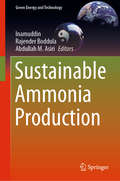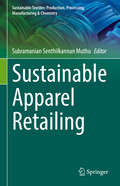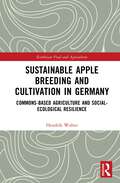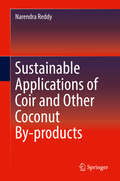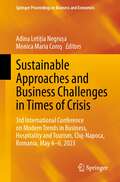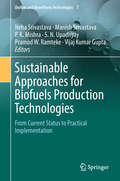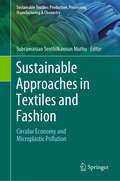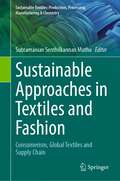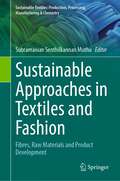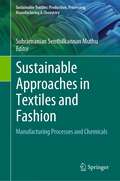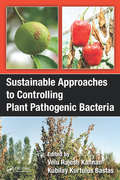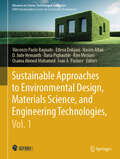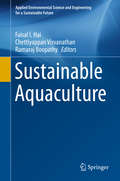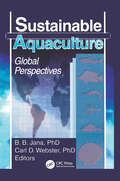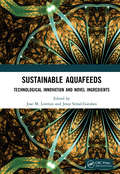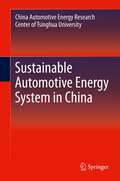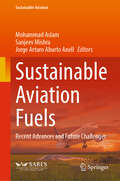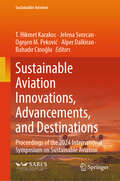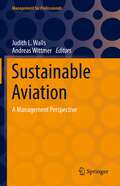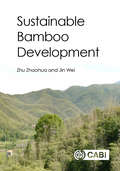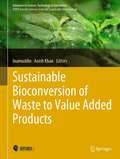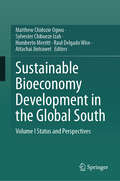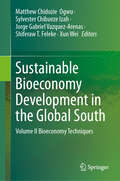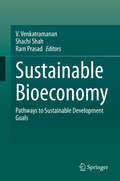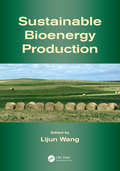- Table View
- List View
Sustainable Ammonia Production (Green Energy and Technology)
by Inamuddin Abdullah M. Asiri Rajender BoddulaThis book presents sustainable synthetic pathways and modern applications of ammonia. It focuses on the production of ammonia using various catalytic systems and its use in fuel cells, membrane, agriculture, and renewable energy sectors. The book highlights the history, investigation, and development of sustainable pathways for ammonia production, current challenges, and state-of-the-art reviews. While discussing industrial applications, it fills the gap between laboratory research and viable applications in large-scale production.
Sustainable Apparel Retailing (Sustainable Textiles: Production, Processing, Manufacturing & Chemistry)
by Subramanian Senthilkannan MuthuThis book offers a variety of cases that detail consumer behavior in the apparel industry as well as sustainable retail practices. The studies offer in-depth examination of sustainable practices within the apparel industry, covering topics such as sourcing sustainable materials, transparency in the supply chain, and innovative manufacturing processes. It also addresses the challenges and opportunities retailers face in balancing sustainability with fashion trends, ensuring compliance with environmental and labor standards, and leveraging new technologies and consumer preferences to drive growth and sustainability.
Sustainable Apple Breeding and Cultivation in Germany: Commons-Based Agriculture and Social-Ecological Resilience (Earthscan Food and Agriculture)
by Hendrik WolterApplying a socio-ecological framework, this book explores how the innovative approach of commons-based organic apple breeding can contribute to sustainability in agricultural and food systems more widely. As fruit breeding and cultivation systems are confronted with a range of sustainability challenges, there are calls for new and innovative breeding approaches beyond mainstream economic solutions that would mitigate these sustainability challenges. Apples, in particular, are facing serious environmental challenges, with the negative environmental impacts of modern conventional breeding and farming, loss of agrobiodiversity, low participation and diminishing diversity of market actors in the wake of privatization and economization trends result in a lack of resilience in current breeding and cultivation systems. Drawing on in-depth case study research on apple production in Germany, this book advances the innovative solution of commons-based apple breeding as a model for developing resilience in fruit breeding and cultivation. It analyzes this approach, comparing it with more conventional practices, and showcases which factors could inhibit the broad implementation of commons-based apple breeding and how they can be overcome to exploit its full potential. Contributing to the great ambition of finding sustainable solutions across all agricultural sectors, this book opens up new and interdisciplinary perspectives on fruit breeding and cultivation, which is a largely neglected issue in contemporary discussions on agriculture and food production. This book will be of great interest for students and scholars from the fields of sustainable food systems, sustainable agriculture, crop science, and resource management and in particular those that seek inspiration for innovative approaches rooted in sustainability research, social-ecological resilience, and the commons.
Sustainable Applications of Coir and Other Coconut By-products
by Narendra ReddyThis book provides detailed information on the methods and techniques that can be used to process coir, cocopeat and other coconut byproducts for developing various bioproducts. Coir is a unique raw material in that it is abundant, green, and sustainable. The most common industrial application of coir is to use it as a reinforcement of composites with other natural or synthetic fibers and resins. Coir-based composites are used in automotive, construction, and packaging, among other applications. Recently cocopeat, coconut shells and other byproducts have been used for energy, environmental remediation and agricultural applications. This is the first reference describing the properties, processability, and applications of all the coconut byproducts. Properties of the products developed are also covered with a major focus on industrial applications.Provides a single, comprehensive reference source on the biorenewable material coir and other coconut byproductsAddresses properties, processing and a broad range of industrial applicationsEnables researchers spanning the materials, polymer, agricultural, composites and environmental areas to identify unique and useful applications of coir and other coconut byproducts
Sustainable Approaches and Business Challenges in Times of Crisis: 3rd International Conference on Modern Trends in Business, Hospitality and Tourism, Cluj-Napoca, Romania, May 4-6, 2023 (Springer Proceedings in Business and Economics)
by Adina Letiția Negrușa Monica Maria CoroşThis book discusses current trends, challenges, and opportunities in the fields of business, hospitality, and tourism, particularly in Eastern Europe. Featuring selected papers presented at the second annual Modern Trends in Business Hospitality and Tourism International Conference held in Cluj-Napoca, Romania in 2023, the enclosed chapters explore the global marketing environment discussing the latest technological, economic and social-cultural developments. Featuring theoretical and empirical research and real-life case studies, this book explores topics such as global capital markets and investment financing post COVID-19, sustainable business models, financing alternatives for SMEs, corporate governance, human capital leadership, among others. It is appropriate for academics, researchers, scholars and practitioners in the areas of business, hospitality and tourism.
Sustainable Approaches for Biofuels Production Technologies: From Current Status to Practical Implementation (Biofuel and Biorefinery Technologies #7)
by P. K. Mishra Neha Srivastava Manish Srivastava Pramod W. Ramteke S. N. Upadhyay Vijaj Kumar GuptaThis volume focuses on technological advances relevant to establishing biofuels as a viable alternative to fossil fuels by overcoming current limitations. The progressive depletion of fossil fuels due to their large-scale utilization and their environmental consequences, notably global warming, increase the need for sustainable and cleaner energy options. Renewable biofuels – like biohydrogen, biomethane, biogas, ethanol and butenol – represent attractive energy sources to meet the growing global demand, thanks to sustainable and cost-efficient production approaches based on cellulosic biomass. Currently, the commercialization of these technologies is hindered by technical and economic limitations, such as biomass complexity and pre-treatment, enzyme hydrolysis, production efficiency as well as storage and cost. As such, this book presents economically viable and sustainable approaches to improve existing biofuel technologies and appeals to anyone with an interest in biofuels as renewable energy options and their practical implementation.
Sustainable Approaches in Textiles and Fashion: Circular Economy and Microplastic Pollution (Sustainable Textiles: Production, Processing, Manufacturing & Chemistry)
by Subramanian Senthilkannan MuthuThis first of this set of books presents the various sustainable approaches in terms of circular economy and micro plastic pollution pertaining to the textiles and fashion supply chain. Sustainability is one of the important aspects in today’s industrial context, which is followed by every industrial sector with no exception to textiles and fashion. Sustainability and strict adherence to the principles of sustainability has become one of the essential needs in industry. There are countless measures in terms of various approaches to make the textiles and fashion sector sustainable. These measures, but not limited to, range from innovating and implementing new fibres and raw materials, introducing innovative manufacturing methods, chemicals, processes to focus on all the possible stages of a textile product’s life cycle from cradle to grave. These approaches include making the textiles and fashion sector circular and also development of new products from sustainable raw materials/processes or combination of both.
Sustainable Approaches in Textiles and Fashion: Consumerism, Global Textiles and Supply Chain (Sustainable Textiles: Production, Processing, Manufacturing & Chemistry)
by Subramanian Senthilkannan MuthuThis second volume in this set of books discusses various sustainable approaches in textiles and the fashion sector with a focus on consumerism and the supply chain. Sustainability is one of the important aspects in today’s industrial context, and is no exception to textiles and fashion. Sustainability and strict adherence to the principles of sustainability has become as one of the essential needs again for any industrial sector including textiles and fashion. There are countless measures in terms of various approaches to make the textiles and fashion sector sustainable. These measures, but not limited to, ranging from innovating and implementing new fibres and raw materials, introducing innovative manufacturing methods, chemicals, processes to focus on all the possible stages of a textile product’s life cycle from cradle to grave. These approaches include making the textiles and fashion sector circular and also development of new products from sustainable raw materials/processes or combination of both.
Sustainable Approaches in Textiles and Fashion: Fibres, Raw Materials and Product Development (Sustainable Textiles: Production, Processing, Manufacturing & Chemistry)
by Subramanian Senthilkannan MuthuThis third volume in the set of books is dedicated to various sustainable approaches in textiles and fashion sector with a focus on fibres and raw materials employed. Sustainability is one of the important aspects in today’s industrial context, which is followed by every industrial sector with no exception to textiles and fashion. Sustainability and strict adherence to the principles of sustainability has become as one of the essential needs again for any industrial sector including textiles and fashion. There are countless measures in terms of various approaches to make the textiles and fashion sector sustainable. These measures, but not limited to, ranging from innovating and implementing new fibres and raw materials, introducing innovative manufacturing methods, chemicals, processes to focus on all the possible stages of a textile product’s life cycle from cradle to grave. These approaches include making the textiles and fashion sector circular and also development of new products from sustainable raw materials/processes or combination of both.
Sustainable Approaches in Textiles and Fashion: Manufacturing Processes and Chemicals (Sustainable Textiles: Production, Processing, Manufacturing & Chemistry)
by Subramanian Senthilkannan MuthuThis fourth volume in the series presents various sustainable approaches in the textile and fashion sector with a focus on manufacturing processes and chemicals. Sustainability is one of the important aspects in today’s industrial context, which is followed by every industrial sector with no exception to textiles and fashion. Sustainability and strict adherence to the principles of sustainability has become as one of the essential needs again for any industrial sector including textiles and fashion. There are countless measures in terms of various approaches to make the textiles and fashion sector sustainable. These measures, but not limited to, ranging from innovating and implementing new fibres and raw materials, introducing innovative manufacturing methods, chemicals, processes to focus on all the possible stages of a textile product’s life cycle from cradle to grave. These approaches include making the textiles and fashion sector circular and also development of new products from sustainable raw materials/processes or combination of both.
Sustainable Approaches to Controlling Plant Pathogenic Bacteria
by V. Rajesh Kannan Kubilay Kurtulus BastasPlant diseases and changes in existing pathogens remain a constant threat to our forests, food, and fiber crops as well as landscape plants. However, many economically important pathosystems are largely unexplored and biologically relevant life stages of familiar systems remain poorly understood. In a multifaceted approach to plant pathogenic behav
Sustainable Approaches to Environmental Design, Materials Science, and Engineering Technologies, Vol. 1 (Advances in Science, Technology & Innovation)
by Ivan A. Parinov D. Jude Hemanth Hasim Altan Ilaria Pigliautile Etleva Dobjani Vincenzo Paolo Bagnato Rim Meziani Osama Ahmed MohamedThis book highlights the sustainable innovation in environmental design, materials science, and engineering technologies. It provides a multidisciplinary approach to addressing contemporary challenges in creating resilient, efficient, and health-promoting built environments. With contributions from leading experts, the book covers a wide range of topics including architectural design, urban planning, sustainable materials, and renewable energy technologies. Also, it explores sustainable solutions and innovative practices across a range of disciplines essential for the future of our built environment. It examines architectural design, urban planning, and infrastructure, highlighting approaches that promote resilience and efficiency in urban settings. The book aligns with sustainable development goals, providing practical insights and strategies to achieve global sustainability targets. This book focuses on sustainable methodologies in material sciences, exploring the latest advancements in eco-friendly materials and their applications in construction. The integration of renewable energy technologies is thoroughly examined, showcasing how these innovations can reduce environmental impacts and enhance energy efficiency. Additionally, the book addresses the crucial theme of environmental integration and impacts, presenting comprehensive studies on the intersection of engineering technologies with environmental sustainability. Furthermore, it is an indispensable resource for professionals, researchers, and students dedicated to fostering sustainable development across multiple fields. It offers valuable guidance on implementing sustainable practices to create a healthier and more sustainable world.
Sustainable Aquaculture (Applied Environmental Science And Engineering For A Sustainable Future Ser.)
by Faisal I. Hai Chettiyappan Visvanathan Ramaraj BoopathyThis book is about important relevant recent research topics in sustainable aquaculture practices. A critical assessment of the sustainable fishing methods and the aspect of sustainable aquaculture feed is presented in this volume. A special focus has been given to socio-economic and environmental assessment of aquaculture practices and analysis of carbon footprint under an intensive aquaculture regime. Aquaponics as a niche for sustainable modern aquaculture has been highlighted. The effect of use of pharmaceuticals to prevent fish disease on the surrounding marine environment is an emerging area of concern, and a critical discussion on this aspect is included in the book. The spread of organic waste and nutrients released by fish farms to natural water bodies has raised considerable concerns. Therefore the methods to prevent their dispersion and removal (treatment) have been comprehensively covered in this book. This book is an essential read for academician, researchers, and policy makers in the field of aquaculture.
Sustainable Aquaculture: Global Perspectives
by Carl D Webster Bana B. JanaExamine the world's leading aquaculture producers! Sustainable Aquaculture: Global Perspectives is a one-of-a-kind primer on the world's leading sources of aquatic production, presenting expert commentary that includes the latest advancements, developments, and research findings. The book examines essential elements of aquaculture (water quality, nutrition, genetics, culture methods) and addresses problems such as over-fishing, coastal and wetland destruction, and habitat and environmental degradation. Sustainable Aquaculture: Global Perspectives addresses policy measures that are essential for the long-term sustainability of the world's fisheriesand the long-term employment of those who rely on the aquaculture industry for their livelihood. As the world's population increases at an alarming rate, the question of how to ensure global food security is one of extreme importance. But the world's total yield is below expectations and the book examines the reasons why: the under-utilization of natural resources, the lack of adoption of modern scientific methods, the lack of standardized, proven pond fertilization protocols; long-term inbreeding and the loss of genetic variability due to genetic drift. Sustainable Aquaculture: Global Perspectives also addresses: freshwater pearl culture breeding programs pond fertilization regimes fish diseases in tropical climates indoor recirculating culture systems water quality management for shrimp farming and much more! With much of its information available in one place for the first time, Sustainable Aquaculture: Global Perspectives is invaluable as a textbook for introductory aquaculture courses and is an essential resource for professionals and researchers.
Sustainable Aquafeeds: Technological Innovation and Novel Ingredients
by Jose M. Lorenzo and Jesus Simal-GandaraAquaculture, the youngest, fastest-growing, and most dynamic protein-producing industry, has the key advantage of efficient use of feed that allows farmed fish to be competitively priced compared with terrestrial proteins. Sustainable Aquafeeds: Technological Innovation and Novel Ingredients explores the present and future evolution of feeds, explains the current challenges for aquaculture, and considers how advances in technologies and ingredients can produce aquafoods for the increasing world population. International contributors to this book provide state-of-the-art information on the profile of the aquafeed industry, including factors affecting supplies and prices of key ingredients for aquafeed production. An entire set of chapters covers the scientific advances and feed industry initiatives in accordance with modern consumer trends, updating readers on the most promising strategies. These include the use of novel ingredients for nutrient supplementation and the enhancement of their use by genetic selection. The authors hope to inspire a collaboration of NGOs, researchers, and private partnerships to replace wild-caught ingredients by accelerating and supporting the scaling of innovative, alternative, aquaculture feed ingredients, including bacterial meals, plant-based proteins, algae, and yeast.
Sustainable Automotive Energy System in China
by CAERC, Tsinghua UniversitySustainable Automotive Energy System in China aims at identifying and addressing the key issues of automotive energy in China in a systematic way, covering demography, economics, technology and policy, based on systematic and in-depth, multidisciplinary and comprehensive studies. Five scenarios of China's automotive energy development are created to analyze the possible contributions in the fields of automotive energy, vehicle fuel economy improvement, electric vehicles, fuel cell vehicles and the 2nd generation biofuel development. Thanks to this book, readers can gain a better understanding of the nature of China's automotive energy development and be informed about: 1) the current status of automotive energy consumption, vehicle technology development, automotive energy technology development and policy; 2) the future of automotive energy development, fuel consumption, propulsion technology penetration and automotive energy technology development, and 3) the pathways of sustainable automotive energy transformation in China, in particular, the technological and the policy-related options. This book is intended for researchers, engineers and graduates students in the low-carbon transportation and environmental protection field. China Automotive Energy Research Center (CAERC), Tsinghua University, established in 2008, is a university-wide interdisciplinary automotive energy research institution affiliated to Laboratory of Low Carbon Energy (LCE), Tsinghua University. More than 30 researchers are working at CAERC, including six full professors. CAERC's mission is to create and disseminate sustainable automotive energy knowledge, research and development of integrated automotive energy system assessment methodologies and models, and provide technological and policy options for sustainable automotive energy system transformation in China and the world.
Sustainable Aviation Fuels: Recent Advances and Future Challenges (Sustainable Aviation)
by Mohammad Aslam Sanjeev Mishra Jorge Arturo Aburto AnellSustainable aviation fuels have the potential to make an essential contribution to decarbonizing the aviation sector and play an important role in strengthening the circular bioeconomy. This book presents recent advances and challenges in sustainable aviation fuel, with contributions from a global group of industry experts exploring alternative fuel technologies, feedstocks and conversion processes, combustion performance and emissions, and the technical and environmental challenges of implementing the use of alternative fuels for aviation. The book presents sustainability assessments, including techno-economic analyses and lifecycle assessments on developing sustainable aviation fuels from renewable sources, mainly from second and third-generation biomass feedstocks. Sustainable Aviation Fuels: Recent Advances and Future Challenges provides an excellent overview of the aviation and green energy sectors and is an invaluable resource for researchers and industry practitioners working on commercially viable sustainable aviation fuels. The book will also provide a foundation for graduate and postgraduate students, researchers, and professionals working in the broader fields of sustainable energy.
Sustainable Aviation Innovations, Advancements, and Destinations: Proceedings of the 2024 International Symposium on Sustainable Aviation (Sustainable Aviation)
by T. Hikmet Karakoc Alper Dalkiran Jelena Svorcan Ognjen M. Peković Bahadır CinoğluSustainable aviation involves developing long-term strategies to address the challenges faced by the aviation industry. The International Symposium on Sustainable Aviation is a multidisciplinary conference that focuses on research related to sustainability issues and future trends in aviation, considering economic, social, and environmental perspectives. The conference covers a wide range of current topics in aviation, such as enhancing aircraft fuel efficiency, promoting the use of biofuels, minimizing environmental impact, reducing greenhouse gas emissions, and addressing engine and airframe noise. The event provides a platform for researchers, scientists, engineers, practitioners, policymakers, and students to share information, present new technologies and developments, and discuss the future direction, strategies, and priorities in aviation and sustainability.
Sustainable Aviation: A Management Perspective (Management for Professionals)
by Andreas Wittmer Judith L. WallsThis book analyses from a management perspective how the aviation industry can achieve a sustainability transformation in order to reach the Paris climate targets for 2050 and provides various strategic and operational recommendations in this regard. It examines various elements of the aviation system exhaustively, including technologies, consumers, airlines, airports and policies, from both short- and long-term standpoints. Specific questions and contradictions, as well as concrete options for taking action, are presented. It also includes numerous practical case studies, which will help practitioners transfer the concepts into their everyday work. The book is aimed at a broad, professional audience consisting of managers, politicians and regulators, but also at advanced students engaged in academic and professional education.
Sustainable Bamboo Development
by Zhu Zhaohua Jin WeiThis book presents over 40 cases of bamboo development from across 22 major bamboo-industry countries and explores the knowledge gained from their successes and failures. It synthesizes experiences and exchanges with country experts from international training courses, study tours, and seminars. Each case includes detailed observations and summaries of discussions related to the development of bamboo-based industries in a healthy, sustainable way to facilitate the strategic and balanced development of the bamboo sectors in different global regions. Industrial and artisanal bamboo growing and processing is expanding worldwide, and this book collates key experiences to inform future developments. Sustainable Bamboo Development: - Is authored by an internationally recognized leading expert in the growth and use of bamboo - Takes a holistic view, covering all aspects of development including technical, socio-economic, policy, cultural, and business development - Provides practical knowledge to guide the development of bamboo sectors - Gives a clear idea and rich examples of what has been attempted in many countries - Acts as a road map for using bamboo as a poverty reduction and environmental security tool Highly illustrated and presented in full color throughout, this book is an essential resource for private sector investors, governmental and development agencies, and academic researchers and students who are all interested in bamboo.
Sustainable Bioconversion of Waste to Value Added Products (Advances in Science, Technology & Innovation)
by Inamuddin Anish KhanThis edited book discusses various processes of feedstocks bioconversion such as bioconversion of food waste, human manure, industrial waste, beverage waste, kitchen waste, organic waste, fruit and vegetable, poultry waste, solid waste, agro-industrial waste, cow dung, steroid, lignocellulosic residue, biomass, natural gas etc. Nowadays, the industrial revolution and urbanization have made human life comfortable. However, this requires excess usage of natural resources starting from food and food products, to energy resources, materials as well as chemicals. The excess use of natural resources for human comfort is expected to high fuel prices, decline natural resources as well as cause a huge hike in the cost of raw materials. These factors are pushing researchers to grow environmentally friendly processes and techniques based on inexpensive and sustainable feedstock to accomplish such worldwide targets. Bioconversion, otherwise called biotransformation, is the change of natural materials, for example, plant or animal waste, into usable items or energy sources by microorganisms. Bioconversion is an environmentally friendly benevolent choice to supplant the well-established chemical procedures utilized these days for the production of chemicals and fuels. A variety of alternatives advancements are being considered and are directly accessible to acquire diverse valuable end-products through bioprocesses. This book discusses in detail the process and techniques of bioconversion by focusing on the organic feedstock of animal and plant origin. It brings solutions to the bioconversion of various feedstock into value-added products.
Sustainable Bioeconomy Development in the Global South: Volume I Status and Perspectives
by Raul Delgado Wise Sylvester Chibueze Izah Matthew Chidozie Ogwu Humberto Merritt Attachai JintrawetThis book provides background knowledge on sustainable bioeconomy development in the Global South and documents its status. It promotes pertinent understanding for the sustainable creation of new value chains within the sector especially in terms of bioenergy and biomaterials as well as the definition of priority areas and supportive framework by local, national, regional and international agencies and consortiums. This book covers the state of affairs of innovative bio-based products from agriculture, forestry, biotechnology, medicine, pharmaceuticals, food and feed, construction materials, bioenergy, paper, and pulp, industrial goods, and environmental management. It also presents narrative-based reviews of bio-based raw materials, processing processes, products, and services that showcase the status of bioeconomy development in the Global South. This book is a reference for trainees and trainers, bioeconomy practitioners and activists, students, civil, private,and public employees and employers, academics, researchers, environmentalists, ecologists, social scientists, agricultural scientists, economists, governmental and non-governmental organization, biodiversity experts, policymakers, conservationists and industries interested in promoting sustainable bioeconomy development in the Global South.
Sustainable Bioeconomy Development in the Global South: Volume II Bioeconomy Techniques
by Sylvester Chibueze Izah Matthew Chidozie Ogwu Jorge Gabriel Vazquez-Arenas Shiferaw T. Feleke Xun WeiThis book covers sustainable bioeconomy techniques and practices in the Global South with a view to promote innovation. The priority areas, needs and required supportive framework by national and international agencies for a sustainable bioeconomy is highlighted. The book also discusses emerging techniques and approaches being used for further development as well as their current and potential impact on important economic sectors. It is predicted that these techniques have the capacity and potential to shape economic growth and development of the Global South. Key sectors that would likely witness the most impact include energy, agriculture, food systems, construction, medicine and pharmaceuticals, engineering, and textiles. Adopting or innovating advanced bioeconomy techniques and practices would boost energy, income, and food security, and independence as well as the competitiveness of the Global South. This volume is a reference for bioeconomy practitioners, activists, students, private and public employees, academics, researchers, environmentalists, ecologists, social scientists, agricultural scientists, and economists. It is also useful for biodiversity experts, policymakers, conservationists and industries interested in promoting sustainable bioeconomy development in the Global South.
Sustainable Bioeconomy: Pathways to Sustainable Development Goals
by Ram Prasad Shachi Shah V. VenkatramananSustainable development is the most important challenge facing humanity in the 21st century. The global economic growth in the recent past has indeed exhibited marked progress in many countries. Nevertheless, the issues of income disparity, poverty, gender gaps, and malnutrition are not uncommon in the global landscape, in spite of the upward growth of the economy and technological advances. This grim picture is further exacerbated by our growing human population, unmindful resource use, ever-increasing consumption trends, and changing climate. In order to protect humanity and preserve the planet, the United Nations issued the “2030 agenda for sustainable development,” which includes but is not limited to sustainable production and consumption practices, e.g. in a sustainable bioeconomy. The hallmark of the sustainable bioeconomy is a paradigm shift from a fossil-fuel-based economy to a biological-based one, which is driven by the virtues of sustainability, efficient utilization of resources, and “circular economy.” As the sustainable bioeconomy is based on the efficient utilization of biological resources and societal transformations, it holds the immense potential to achieve the UN’s Sustainable Development Goals. This book shares valuable insights into the linkages between the sustainable bioeconomy and Sustainable Development Goals, making it an essential read for policymakers, researchers and students of environmental studies.
Sustainable Bioenergy Production
by Lijun WangGiven the environmental concerns and declining availability of fossil fuels, as well as the growing population worldwide, it is essential to move toward a sustainable bioenergy-based economy. However, it is also imperative to address sustainability in the bioenergy industry in order to avoid depleting necessary biomass resources. Sustainable Bioene
